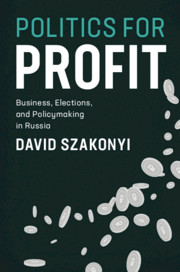Book contents
- Frontmatter
- Dedication
- Contents
- List of Figures
- List of Tables
- Acknowledgments
- Introduction
- 1 A Theory of Businessperson Candidacy
- 2 Identifying Businesspeople Who Run for Office
- 3 Economic Competition, Weak Parties, and Businessperson Candidacy
- 4 Choosing Ballots, Parties, and Delegates
- 5 Firm-Level Returns from Businessperson Candidacy
- 6 Businesspeople as Policymakers
- 7 Conclusion and Policy Recommendations
- Appendix
- Bibliography
- Index
- Series Page
1 - A Theory of Businessperson Candidacy
Published online by Cambridge University Press: 15 June 2020
- Frontmatter
- Dedication
- Contents
- List of Figures
- List of Tables
- Acknowledgments
- Introduction
- 1 A Theory of Businessperson Candidacy
- 2 Identifying Businesspeople Who Run for Office
- 3 Economic Competition, Weak Parties, and Businessperson Candidacy
- 4 Choosing Ballots, Parties, and Delegates
- 5 Firm-Level Returns from Businessperson Candidacy
- 6 Businesspeople as Policymakers
- 7 Conclusion and Policy Recommendations
- Appendix
- Bibliography
- Index
- Series Page
Summary
This chapter develops the main argument to explain businessperson candidacy. As a direct strategy, businessperson candidacy gives interest groups unmediated access to policymaking, in contrast to indirect strategies, such as lobbying and making campaign contributions, which require politicians to work as intermediaries. Why do firm directors invest resources into occupying elected office, rather than use the more conventional indirect approaches? At heart is a commitment problem: there is no guarantee that money given to a politician will be returned in-kind with policy. Firms cannot specify quid pro quo arrangements with politicians where policy influence is traded for contributions such as money, information, and/or votes. Businesspeople then run for elected office when (1) they cannot trust that the politicians they lobby will represent their interests and (2) their firms have the resources available to contest elections. This theory predicts the probability of politician shirking (reneging on their promises) depends on the extent of economic competition and presence of political parties capable of enforcing informal quid pro quo agreements. When politicians are untrustworthy and unresponsive to special interests, directly occupying a legislative seat becomes the only viable legal avenue for a firm achieving desired political influence.
Keywords
- Type
- Chapter
- Information
- Politics for ProfitBusiness, Elections, and Policymaking in Russia, pp. 30 - 78Publisher: Cambridge University PressPrint publication year: 2020

